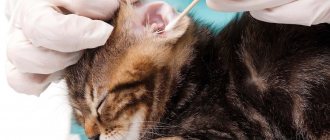About the reasons
If a cat bites your hand or aggressively rushes to your feet, you should not shout and punish it, because such behavior does not occur without reason. Most often, the animal begins to scratch its owner, expressing its hunting instinct. Often this behavior is associated with insufficient education, and sometimes it indicates that the pet is experiencing physical or psychological discomfort. Therefore, it is first important to find out what caused this behavior, and only then take measures that will help wean the animal from biting and scratching the owner.
How to stop a cat from biting?
It is unlikely that the owner of a cat or kitten is happy with his aggressive behavior (not to be confused with normal playfulness), because scratched hands and bites are usually painful and do not heal for a long time. The approach to this problem should be differentiated, depending on the age of the animal.
Important! It is almost impossible to wean an adult animal from this bad habit, so it is better to educate it from a very early age.
Before you start weaning your kitten off a bad habit, you should take it to the vet. The doctor will examine the baby and provide a report on his state of health.
Specialists pay special attention to the development of correct bite in young cats, as well as good growth and replacement of teeth. If a kitten bites due to the replacement of milk teeth with molars, then he should buy special toys. The opportunity to sharpen its teeth on such toys will distract your pet from your hands and feet.
It should be borne in mind that the temperament of a cat is far from the character of a dog. It cannot be trained, so the animal will only do what it likes. Based on this, consider the following practical tips:
- Tenderness is good medicine, so don’t be lazy to hold the kitten in your arms more often - then there will be a greater likelihood that it will become affectionate and not so wild and aggressive.
- You should not force the animal to play, because it will perceive your efforts as hostility.
- It is better to do without cutting your nails. But if you decide to do this, contact a specialist. It is highly undesirable to carry out this procedure at home, as this can lead to infection.
- When a kitten or cat aggressively attacks you, you can spray the animal with water from a spray bottle. Repeat this several times - this will discourage him from attacking you.
- If the cat does bite you, do not jerk your hand away abruptly. This is how prey behaves - it breaks free and tries to escape. It is better not to move or even move the bitten hand towards the cat. This will most likely confuse her and she will let you go.
- If the kitten starts biting and scratching, you can clap your hands hard. A loud and sharp sound will serve as a kind of signal and the animal will understand that it is acting incorrectly.
- A good way to stop a cat from hurting you is to ignore it. If your cat begins to bite painfully, just get up and walk away. She will realize that you do not like such actions and will stop attacking.
- Some try to exhaust the cat with games - when she is tired, she will not have the strength to be aggressive.
- The cat must have its own private place where it will feel safe. It can be a simple box or a special house. Such a personal corner will make your pet much calmer.
- When playing with a kitten, there is no need to turn the game into a tough fight. Games should take place in a calm manner.
- Don't let other people tease your kitten.
Showing love
Animal psychologists who study the character and habits of cats agree that cat bites are one of the ways of communication. If a pet often bites its owner, perhaps this is his way of expressing immeasurable love and devotion. Many owners have noticed that when you scratch their four-legged friend’s neck or behind the ear, he will definitely turn around to bite the person’s hand. However, this bite does not cause pain, but is more like a tingling sensation. But when the animal’s emotions go off scale, the biting becomes more intense.
Basic rules of education
Punishment should follow immediately after the bite. This is the only way to form a cause-and-effect relationship between a human bite and the onset of unpleasant consequences.
- Punishment should not be painful.
- Your reaction to bites should be constant and the same.
- Socialization problems and solutions.
Socialization
Socialization is an important aspect; the formation of a kitten’s character largely depends on it. This is not only communication, but also a model of subsequent behavior in any unclear situations.
Often an animal begins to bite in the following cases:
- on the street;
- at a veterinarian's appointment;
- during transportation;
- when a large number of guests arrive;
These are signs of insufficient socialization. Any unusual situation provokes the onset of a stressful state. The animal becomes aggressive and tries to bite upon any contact.
These problems can be avoided if proper adaptation is carried out in time.
How to socialize a kitten?
The main rule is to start as early as possible.
The optimal period is considered to be from 2 to 7 months, when the psyche is most receptive. By the way, maybe it’s time for your baby to start trimming his nails. All potentially frightening situations must be turned into positive ones. You can use a game or a treat as a reward.
You should be careful when placing your kitten in situations that make him feel afraid.
Important!
Show safety in as many new situations as possible.
The more stressful situations you help your kitten overcome, the calmer he will react to them. The connection between unclear situations and the onset of positive consequences will be strengthened.
Important:
Lack of socialization can be observed not only in street or shelter animals. Pedigree kittens that come from a good nursery may have the same problem.
Psychological characteristics and solution
Another common cause of bites is the psychological characteristics of the animal.
All cats have different personalities. Some love the company of people and affection, others prefer loneliness and are characterized by increased aggressiveness. And it’s quite normal if the kitten resists when you pet him - perhaps he didn’t have plans to pet him right now! The most common psychological causes of kitten bites are:
- Instinctive reactions of the psyche. (territorial, sexual, redirected, defensive aggression).
- Unreasonable inappropriate aggression (idiopathic).
- Character traits. The tendency to aggression in cats manifests itself at the genetic level. If the kitten's father had an evil disposition, this will most likely be passed on to his descendants.
- Neurotic. Caused by the presence of a disease.
- Lack of a “corner” – your baby needs a place where he can hide. Watch how your kitten behaves: where does it try to sit - as high as possible or on soft surfaces, in box houses?
Correcting this behavior often requires the services of a specialist. It is necessary to examine the animal and exclude the presence of diseases that provoke aggression.
Important:
Medication may be needed.
To avoid harm from your kitten’s teeth, use the following tips;
- Contact must occur at the initiative of the animal. If your pet doesn’t let you pet him, it’s not the right time.
- You need to monitor for signs of impending aggression and stop communicating with the animal in advance.
- Do not pick up a frightened or unhappy kitten.
Teething
If the owner is bitten by a kitten, then most often the reason for this behavior is teething. In such situations, the baby constantly tries to put something in his mouth, which is quite normal for this age. To prevent a kitten from growing into a naughty prankster, it is important to explain from an early age that this cannot be done.
To help your cat cut teeth faster and stop biting, it is recommended to buy a special rubber toy that your pet can chew on when he wants to “scratch” his gums.
What to do if your cat scratches
To stop a cat from scratching, you can use the tips we gave above or try these:
- To stop the kitten from rushing and scratching, you can use its natural fear - throw a towel or light pillow over it. The sudden onset of darkness will sober up the child who is playing up, and an association will form in his head: if I scratch, it’s dark. Be patient, raising a kitten is a long process.
- If a kitten or adult animal scratches while playing, distract its attention. Take your hands off. Invite him to play with a toy or teaser. Be adamant and stop all attempts by children and guests to play with the animal with their hands.
- Try to stop your kitten from scratching using noise. Every time the animal releases its claws, stop the raging “aggressor” with a loud sound. You can clap your hands sharply, hit the pan with a spoon, or drop something on the floor. The cat is sobered by sharp loud sounds. If you repeat “sound punishment” constantly, the cat will learn a lesson, and it will be possible to prevent an attack on a person with this sound.
- If you use the words “no” or “teeth” to discourage biting, do not use them when your cat scratches you. Choose another conditional punishment word. For example, “claws” or “paws”. You need to say the punishment word in a loud, calm voice every time the animal tries to use its claws on you, your household or guests.
If none of the above helped you, remember how a mother cat teaches kittens. Gently grab the “furry aggressor” by the scruff of the neck – in this position he will immediately calm down and become quiet!
Boredom
Often an adult cat bites its owner simply because it is bored. The animal wants to attract attention, so it first begins to lick, and if the owner does not react, then bite. In order for your pet to stop behaving this way, it is recommended to spend more time with him, playing, talking, or just sitting together in front of the TV.
Cats perfectly understand the mood of the owner, and just like people, they require communication and attention. You should not scold or punish an animal when, after a long separation, it begins to lick and bite. In such situations, it is important to communicate with your four-legged friend so that he understands how dear and loved he is in the family.
Rules for playing with a kitten
It is strictly forbidden to play with the kitten with your hands! Because of such a common mistake, the animal gets used to attacking hands and the older the cat becomes, the more serious the problem for the owners. If the baby begins to bite during play, you must immediately remove your hands. It is necessary to switch his attention and make it clear that hands and other parts of the human body are not objects for biting and scratching.
When playing with a small kitten, use special cat toys. Toys are both a means of leisure and a pet’s personal property. A kitten who has his own things does not feel offended or left out. Try to choose things for him that match his character. These can be models of mice, teasers, balls, feathers on long handles, products with peppermint and others. Let him have his own bedding and also give him your unwanted items. An old sweater with your scent will come in handy for the confident development of a still fragile baby.
Knowing the reasons for aggressive behavior, the owner needs to apply the correct methods of training it. If biting and scratching was caused by stress, then you should seek help from a specialist. The good news is that it is possible to change the behavior of an aggressive pet. To do this, be patient, consistently follow all the above recommendations and be sure that your work will be rewarded with the exemplary behavior of your beloved animal.
Resentment
If a cat is offended by its owner for some reason, it will always find an opportunity to take revenge. Some, expressing emotions, spoil things, others make piles and puddles in the wrong places, and still others bite the offender so that he will forever remember that offending a cat is a bad idea.
The dream books say that if a cat bites a person in a dream, in real life the dreamer has seriously offended someone. If a cat bites someone else, it means the person himself is harboring a grudge against a loved one or friend. In any case, if a cat behaves aggressively in a dream, this is an unfavorable sign, warning that in real life you need to prepare for bad changes, and a blow will most likely come from close people.
Game VS aggression
Reference!
A small kitten spends up to 60% of his waking time playing. In the form of a game, basic rules of behavior are taught, signals of attack and reconciliation are mastered.
During play, the kitten may begin to bite the hands or feet of people with whom it plays. Light biting in play (false aggression) is normal natural behavior of a kitten, which can be corrected. If the bites become painful, it means the kitten cannot control its instincts.
Such games are most often observed in small kittens separated from their mother too early. No one explained to him the inadmissibility of biting and using force in the game.
Signs of gaming aggression
- attack at certain moments;
- attack while moving;
- mild bites;
Important:
real aggression directed at humans is extremely rare among felines. And, as a rule, it is of a neuralgic nature.
Signs of aggression:
- ears pressed to the head;
- hissing or low growling;
- arched back;
- dilated pupils;
Sexual hunting
Puberty in cats of popular breeds occurs at the age of 6–9 months. Hormonal surges sometimes make the animal unrecognizable. The cat yells all day, doesn’t sleep, marks its territory, and becomes aggressive. The cat does not leave a single step from the owner, constantly rubs against the legs, caresses due to overexcitation, and bites.
If the owner does not plan to breed offspring, then the only option to save the animal from such torment is castration or sterilization. Some owners are hesitant to resort to such drastic measures. Then veterinarians advise giving the pet a separate room during the period of heat, where no one will disturb him or get on his nerves.
Maine Coon temperament and types of aggression
The ability of cats to adapt to any conditions is one of the main reasons why they were able to survive in ancient times. The Maine Coon is an excellent example for this situation. The breed was formed in unfavorable conditions and managed to conquer indigenous territory.
Cats are widely recognized for their highly developed hunting instincts.
The Maine Coon's reaction to external stimuli depends on the type of its temperament. Among the representatives of this breed, phlegmatic and sanguine people are most often found. Such cats quickly adapt to new conditions and are extremely rarely angry.
- The characteristic features of a phlegmatic cat are slowness and calmness. The animal will feel comfortable even in a small apartment. A phlegmatic cat prefers rest to active games and can sleep almost all day.
- A sanguine cat quickly gets used to a new home, gets along easily with other pets and loves children. A Maine Coon with this type of temperament is very curious and active.
The types and reasons for aggression in big American cats also vary.
- It all starts with a negative attitude towards the current situation - at first the cat will not show anger. But its behavior can change dramatically - the animal will become disobedient and may ignore a person who is unpleasant to it.
- The Maine Coon warns of a possible attack - it hisses, arches its back, raises the “ridge” on its spine and fluffs its tail. The final phase is pinned ears and nervous tail tapping.
It has been noted that the first and second stages are more typical for Maine Coons with a choleric temperament. They let off steam in a safe way and rarely resort to direct attack. But sanguine people often “skip” the first point. But then they seriously “explode”.
In such a situation, the evil Maine Coon is already scary and unstoppable. They use claws and teeth that can cause deep wounds.
Important! A Maine Coon's motiveless attack on a person is rare. Even in an isolated case, the incident should be a cause for concern, and its recurrence signals a serious problem that needs to be addressed urgently.
Hunger, thirst
When a cat is hungry, it becomes irritated, and if a person ignores a request to feed, don’t be surprised that the animal begins to behave just as carelessly towards him. It is important to feed your four-legged friends with quality food on time.
Irritation can also be associated with thirst. Therefore, pets should always have fresh, clean water at their disposal.
Stress
If the cat is frightened by something or is stressed due to recent unpleasant events, its behavior may be inappropriate. Nervous tension in such situations results in different ways. Some refuse to eat, others hide in a secluded place, and others begin to bite their owners, showing by this behavior that they are uncomfortable.
In such situations, it is first of all important to reduce the stress factor to a minimum. The animal should feel constant support, understanding, love. If the cat is clearly worried, owners are advised to communicate with him more often, play, and walk. As soon as the pet recovers from stress, its behavior will return to the same as before. You just need to wait out this period and do everything to make your four-legged friend feel safe.
The nuances of raising a kitten from the first days of life together
In order to raise a kitten to be obedient and affectionate, you need to know the characteristics of the periods of its development. And in each of them apply the most appropriate methods of influence.
They begin raising the baby immediately after the completion of the period of adaptation to the new place of residence.
They begin to raise the baby immediately after the completion of the period of adaptation to the new place of residence. The first and main concern at this time is litter box training. This must be done affectionately, calmly and persistently. Many cats immediately understand what is wanted from them and begin to perceive the litter box as their latrine.
Immediately after a kitten appears in the house, they carefully observe it, trying to find out what kind of character the pet has. Punishment, even with the best intentions, is unacceptable. The kitten is not yet able to understand what exactly caused the owner’s dissatisfaction, and physical pain will only cause fear or resentment.
With systematic punishment, the animal will develop character traits such as aggressiveness and bitterness. Or on the contrary: the animal will become downtrodden and fearful. In the first six months, it is recommended to avoid situations that are stressful for your pet: noisy feasts and parties.
Recommendations for raising kittens
- Playing with the owner's hands is not allowed. The animal is taught to play with toys.
- When aggressive behavior occurs, they try to distract the kitten and offer it to play in the most interesting way for it.
- A friendly attitude towards the owner and conflict-free play are encouraged with the help of treats.
- Starting from 5–6 months, the kitten is accustomed to the scratching post. In the future, this will avoid dissatisfaction with the fact that the animal sharpens its claws on furniture or other interior items.
- If you intend to get a second animal, it is better to do this before the pet is six months old. It is easier to accustom a kitten to being around a dog or cat while it is small.
- If the owner is not satisfied with the behavior of a cat under six months of age, one of the effective punishments is to ignore it.
- Aggression in any form must be stopped immediately. Choose the most appropriate method for a particular situation. This could be ignoring, a frightening hissing, or lifting by the scruff of the neck.
If there is a dominant person among the owners in the house, the animal will quickly understand this and may begin to obey only this person. They correct the situation through the joint efforts of people. The one whom the cat considers the owner should show as much attention and care as possible to the rest of the family. Soon the animal will understand the message and begin to imitate the owner, without showing aggression towards members of the household that are of secondary importance to her.
If there is a dominant personality among the owners in the house, the animal will quickly understand this
There is also such a problem as the “cult of the master.” Animals that adore their owner are ready to protect him from all dangers. Even harmless games between family members, guests, and strangers seem like this to them. This problem is difficult to deal with. There are many reviews from cat owners that such “passion” is invincible. There is only one way out: you need to understand what exactly causes the cat’s aggression and try to minimize or eliminate this factor.
Often, with the appearance of a small child in the house, the cat’s behavior changes for the worse. This is a dangerous situation for the baby, caused by the jealousy of the animal. During this period, the pet needs to prove that he is still loved and give him as much love and attention as possible. Soon the animal will understand that it is just as important to its owner as before. And the cause of aggression (jealousy) will be eliminated.
Diseases
Cats cannot tell humans what and where they hurt. But by your pet’s behavior you can understand that something is wrong with your pet’s health. For example, if an animal has an injured limb, and a person, without knowing it, accidentally touches the leg, causing an attack of acute pain, the cat, showing emotions, will scream, hiss or bite.
Feline diseases manifest themselves in different ways, and not every one is accompanied by pain. However, the owner should be wary if the cat behaves uncharacteristically, and the following symptoms are also present:
- Lethargy, weakness;
- Refusal to eat and drink;
- Dry nose, which indicates a high temperature;
- Restless sleep.
A common disease diagnosed in older cats is urolithiasis. With this pathology, the animal begins to worry while visiting the toilet, endlessly licking itself under its tail, and urinating past the tray. These are characteristic signs of ICD, in which delaying a visit to the veterinarian is dangerous.
Why does the Maine Coon bite?
There are not as many reasons for cats to show anger as it might seem at first glance. The most important thing is to understand the origins of the Maine Coon’s discontent and try to avoid the sharp edges of risky relationships in the future.
- Genetic predisposition – the presence of aggression in one or two parents.
- Mental disorders in the early period. These include the loss of a mother, early release of kittens from parental care, and intra-litter bonds.
- Self-defense in the face of everyday or behavioral stimuli. For example, some cats guard food like dogs and get angry when they are approached while eating food.
- Painful sensations and hidden injuries are a common cause of anger in Maine Coons. If at such a moment you show careless initiative and try to pick him up, then angry bites and deep scratches will be a completely logical reaction on the part of the cat.
- Hormonal disruptions, protection of personal territory and interspecies struggle are in last place on the list of reasons for the attack. The breed is quite stable in genetics and willingly shares space with people and other pets.
The most common excuse for an attack is dislike for a specific person. This rarely happens to animal owners, and “uncomfortable” guests may well suffer from the sharp claws of an angry cat.











